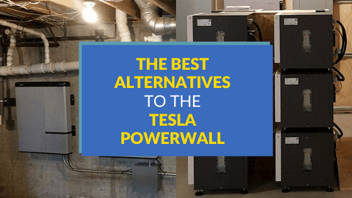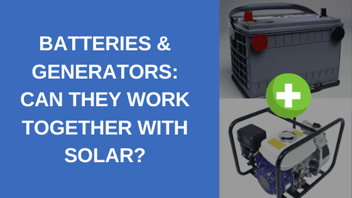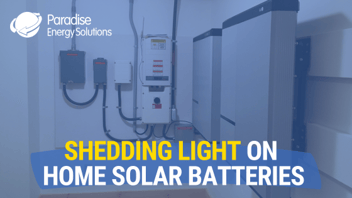Understanding Home Solar Batteries: The Best Backup Options for Homes
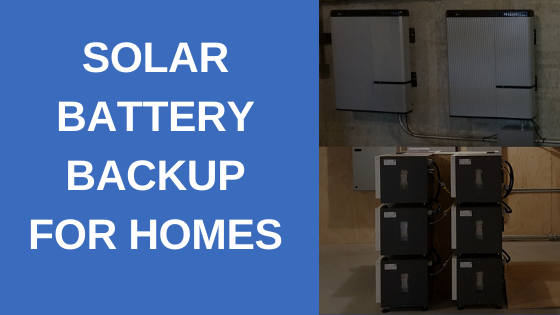
The house goes dark, and then everything quickly gets eerily quiet. You soon realize the power has gone out and the uncertainty of when it will come back on sets in. Will the freezer thaw out? Will my basement flood because the sump pump isn’t running? We’ve all been there, and frankly, it can be unnerving.
A few options are available for those who want the peace of mind and security that a backup energy source can provide for a family. One option is to install a generator that will kick in when the power goes off. The other option is to install a home solar energy system with a battery backup package. You can learn more about a generator vs. battery here, but for this blog, we will focus on the best solar battery backup options for homeowners.
Solar Battery Terminology You Should Know
It's important to understand the common terminology that you will come across when examining battery options.
- Backup Load - The equipment and devices that are important to keep running when the power goes out - your refrigerator or sump pump.
- Peak Power Requirements - This is the maximum amount of electricity you will use at one time. Your Peak Power Requirements can be calculated by adding up the maximum running wattage for your backup loads plus all their starting wattages.
- Surge - This is the maximum amount of energy that can flow from the battery at a given time - the startup power.
- Continuous - This is the amount of energy that the battery can sustain after the initial start-up phase.
- Kilowatt-hour (kWh) - This is the amount of energy that is produced - think of a bucket full of water. The kWh is the amount of water in the bucket.
- Kilowatt (kW) - This is the flow of energy. It’s the flow/rate of water leaving the bucket (how many gallons per minute).
Home Solar Battery Packages
To make things simple, we’ve put together two battery backup packages using the best home solar batteries available. Both battery packages provide our customers with a cost-effective, reliable backup energy solution. Our basic package is designed to keep essential equipment running. The advanced package is designed as a whole-house backup system.
When deciding which battery package is best for you, it’s important to answer the following questions:
- What are the essential items that you need to be powered, and how many hours per day do you use them?
- Do you want to energize only your backup loads or do you want your whole home to keep on functioning as if the grid was functioning?
- Do you want the battery system to integrate with a generator?
- How many days of backup do you want without input from solar or the grid?
Your answers to these two questions will help you determine which battery package is best for your home.
| Generator Interactive | Surge | Continuous | Batteries | |
| Basic Package | Yes | ~7.5 kW | ~ 5 kW | 1-3 (9.3 - 27.9 kWh) |
| Advanced Package | Yes | ~12 kW per inverter | ~9 kW per inverter | 1-20 (14 - 280 kWh) |
The Basic Home Battery Package
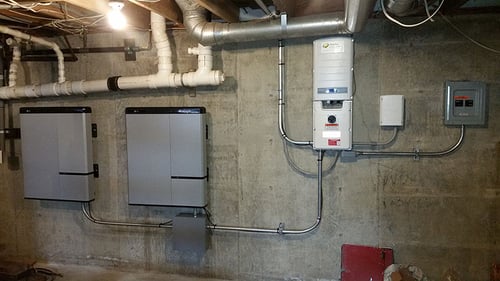
This package is designed to energize small, lightly used loads. It has a limited surge capacity (well pump & lights); however, if a proper start-up process is in place to stay under the surge limit, this package can handle the continuous power of these items.
The details:
- Surge: ~7.5 kW
- Continuous: ~5 kW
- Batteries: 1-3 (9.3 - 27.9 kWh)
- Battery run time: dependent on loads (approximately 3.5 hours per battery for a refrigerator, freezer, and microwave)
- Equipment: SolarEdge EnergyHub and battery
- Space requirements: estimated 20” x 35” for the inverter and 30” x 36” per battery (subject to working space requirements)
- Installation: batteries are mounted on a wall, commonly near the solar inverters
What it will power:
- Small, lightly used loads (example: well pump, 2 freezers, and (4) 13W light bulbs)
- The start-up of each item listed above would need to be staggered due to the inability to support the surge capacity. Continuous running of those items is supported.
Some important items to note:
- This package can’t be used with a generator. Loads can be powered by either a generator or batteries, not both.
- The package is designed to run on a single-phase service. Three-phase is available, but it would require different equipment and increase the cost.
Basic solar battery storage system cost:
- $21,000+ for one battery
- $34,000+ for two batteries
- $46,000+ for three batteries
*The cost will increase if the batteries are not installed simultaneously with your solar system. Learn more about the cost of installing solar.
*There is a 30% Federal Tax Credit available for solar batteries. Also, many states have additional incentives. Maryland, for example, offers a 30% tax credit for up to $5,000 for residential and $75,000 for commercial installations.
The Advanced Home Solar Battery Package
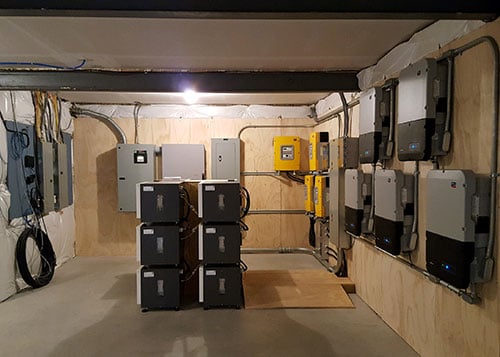
The Advanced Battery Package is the perfect option for those looking for a whole home backup. With higher surge and continuous capacity, this is a good option to keep most of your home’s items running without much notice of the grid being down.
The details:
- Surge: ~12 kW
- Continuous: ~9 kW per inverter
- Batteries: 1-20 (14 - 280 kWh)
- Battery run time: dependent on loads (approximately 3 hours per battery for a refrigerator, freezer, and microwave)
- Equipment: Sol-Ark inverters and Fortress Power Batteries
- Space requirements: estimated 18” x 24” for the inverter and 22” x 22” per battery (subject to working space requirements)
- Installation: batteries are installed on the floor - each battery is 42" high
What it will power:
- Potential for whole-house backup
- The system would likely handle the surge capacity of most American homes. More than one inverter may be required.
Some important items to note:
- This package can be installed to work with a generator. When the power is out, the Sol-Ark inverter charges the battery with solar energy first and then switches to the generator.
- This package is designed to run on single-phase service. Three-phase is available, but it would require different equipment and increase the cost.
Advanced solar battery storage system cost:
- $85,000+ for one Sol-Ark and two batteries
- $25,000+ for additional batteries
*The installation cost will increase if the batteries are not installed simultaneously with your solar system. Learn more about adding batteries to an existing solar system.
*Federal and state tax incentives are available for solar batteries - including a 30% Federal Tax Credit. Maryland has state-level incentives that offer up to $5,000 for residential installations and up to $75,000 for commercial.
Have questions about solar batteries or solar energy installations? Send us a message, and one of our solar experts will get back to you as soon as possible.
At Paradise Energy, we’ve installed over 2,000 solar systems throughout the mid-Atlantic. If you’re in the market for a solar system and/or a battery backup system, visit our battery calculator to see how many batteries you'll need along with the estimated cost, determine how much you could save using our solar savings calculator, or contact us for a custom quote using the button above.



